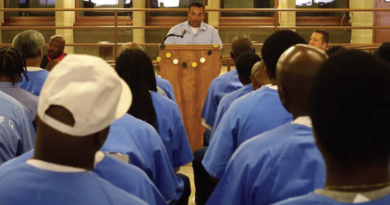A High Cost: Hundreds losing years of good time credits under Prop 57 rollback

Imagine you are just days from paroling after being found suitable from a life sentence.
You are waiting for confirmation of your final release date so you can call and let your family know when to pick you up in the parking lot. Then the rug gets pulled out from underneath you. You receive paperwork notifying you that your date has been changed.
Instead of going home some time this week, your release date has been recalculated to a day in 2029. Devastated and in shock, you must call and tell your family that although your parole grant stands, you now owe the state an additional five and a half years before you can parole.
This was the devastating and heartbreaking reality experienced by Brenda Barerra as she navigated the Parole Board process earlier this year.
Barerra was found suitable at her initial parole board hearing on Jan. 5, 2024. Like many incarcerated individuals who are committed to their change and rehabilitation, she participated in many educational and self-help programs.
These programs not only provided opportunities for growth, but under Proposition 57, which passed in November of 2016, allowed incarcerated individuals with indeterminate sentences to earn Rehabilitation Achievement Credits (RAC) and/or Milestone credits that could be applied by the California Department of Corrections and Rehabilitation (CDCR) toward their Minimum Eligible Parole Date (MEPD).
Unfortunately, due to strong and vocal opposition to Proposition 57, a Dec. 13, 2023 ruling and a Jan. 26, 2024 judgment by a Sacramento County Superior Court now prohibits CDCR from releasing on parole an indeterminately sentenced individual whose MEPD date was advanced due to Prop 57 credits.
This ruling is being appealed by CDCR.
Due to this ruling, Barerra lost five and a half years of RAC and milestone credits she had earned through her programming efforts over the years. These years of credits were earned from her participation in self- help classes, college classes, vocational trainings and more. All — efforts to broaden her mind, provide healing, process trauma and enrich employment opportunities.
Bererra is currently working as a Peer Support Specialist, a job that is a keystone of the California Model and is in high demand in the community. This position required months of special training by Sacramento trained medical staff. And allows her to use her lived experience to help others navigate the medical system, create goals, maintain recovery and receive necessary resources for successful rehabilitation and reintegration into society.
The Parole Board and the governor have already found that Barerra is suitable to re-enter society. Yet, due to the changes to Prop 57, she must stay locked up another five and a half years because the programming credits she earned were rescinded.
I ask you, what is the purpose of this? It is clearly not for rehabilitation. And at what cost? At last check, the state of California is paying $131,000 a year to house an incarcerated individual. The state will pay a total of approximately $820,500 to continue to house Barerra in prison for those five and a half years even though she has already been deemed rehabilitated. Can’t you imagine a better way to spend such a substantial sum of money?
And Barerra is just one example of an individual impacted by these changes.
Many other incarcerated individuals are going to their initial parole board hearings and are receiving parole grants. Their parole hearing dates are still allowed to be advanced due to Prop 57 credits earned through rehabilitative and educational programs, but the credits are no longer allowed to be applied to their MEPDs.
This injustice must be corrected if CDCR is to live up to its name promising to deliver not only correction but rehabilitation. Once rehabilitation is demonstrated and parole is granted and confirmed by the governor, allow the individual to parole and become the productive member of society that he or she has proven to be.
Anything else is now retribution not rehabilitation.




What can I do to help?
Write my state representatives?
How can I support CDCR’s appeal?
What’s the best way to replace Jennifer Rockwell? Political action? Appeal to Newsom? Rallies??
Any other ideas?